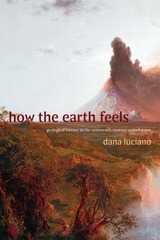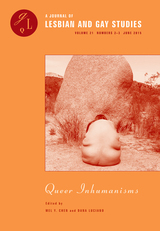2 books by Luciano, Dana

How the Earth Feels
Geological Fantasy in the Nineteenth-Century United States
Dana Luciano
Duke University Press, 2024
In How the Earth Feels Dana Luciano examines the impacts of the new science of geology on nineteenth-century US culture. Drawing on early geological writings, Indigenous and settler accounts of earthquakes, African American antislavery literature, and other works, Luciano reveals how geology catalyzed transformative conversations regarding the intersections between humans and the nonhuman world. She shows that understanding the earth’s history geologically involved confronting the dynamic nature of inorganic matter over vast spans of time, challenging preconceived notions of human agency. Nineteenth-century Americans came to terms with these changes through a fusion of fact and imagination that Luciano calls geological fantasy. Geological fantasy transformed the science into a sensory experience, sponsoring affective and even erotic connections to the matter of the earth. At the same time, it was often used to justify accounts of evolution that posited a modern, civilized, and Anglo-American whiteness as the pinnacle of human development. By tracing geology’s relationship with biopower, Luciano illuminates how imagined connections with the earth shaped American dynamics of power, race, and colonization.
[more]

Queer Inhumanisms
Mel Y. Chen and Dana Luciano, special issue editors
Duke University Press
This issue features a group of leading theorists from multiple disciplines who decenter the human in queer theory, exploring what it means to treat “the human” as simply one of many elements in a queer critical assemblage. Contributors examine the queer dimensions of recent moves to think apart from or beyond the human in affect theory, disability studies, critical race theory, animal studies, science studies, ecocriticism, and other new materialisms. Essay topics include race, fabulation, and ecology; parasitology, humans, and mosquitoes; the racialization of advocacy for pit bulls; and queer kinship in Korean films when humans become indistinguishable from weapons. The contributors argue that a nonhuman critical turn in queer theory can and should refocus the field’s founding attention to social structures of dehumanization and oppression. They find new critical energies that allow considerations of justice to operate alongside and through their questioning of the human-nonhuman boundary.
Mel Y. Chen, Associate Professor of Gender and Women’s Studies at the University of California, Berkeley, is the author of Animacies: Biopolitics, Racial Mattering, and Queer Affect, also published by Duke University Press. Dana Luciano is Associate Professor of English at Georgetown University. She is the author of Arranging Grief: Sacred Time and the Body in Nineteenth-Century America and editor, with Ivy G. Wilson, of Unsettled States: Nineteenth-Century American Literary Studies.
Contributors: Neel Ahuja, Karen Barad, Jayna Brown, Mel Y. Chen, Jack Halberstam, Jinthana Haritaworn, Myra Hird, Zakiyyah Iman Jackson, Eileen Joy, Eunjung Kim, Dana Luciano, Uri McMillan, José Esteban Muñoz, Tavia Nyong’o, Jasbir K. Puar, Susan Stryker, Kimberly Tallbear, Jeanne Vaccaro, Harlan Weaver, Jami Weinstein
Mel Y. Chen, Associate Professor of Gender and Women’s Studies at the University of California, Berkeley, is the author of Animacies: Biopolitics, Racial Mattering, and Queer Affect, also published by Duke University Press. Dana Luciano is Associate Professor of English at Georgetown University. She is the author of Arranging Grief: Sacred Time and the Body in Nineteenth-Century America and editor, with Ivy G. Wilson, of Unsettled States: Nineteenth-Century American Literary Studies.
Contributors: Neel Ahuja, Karen Barad, Jayna Brown, Mel Y. Chen, Jack Halberstam, Jinthana Haritaworn, Myra Hird, Zakiyyah Iman Jackson, Eileen Joy, Eunjung Kim, Dana Luciano, Uri McMillan, José Esteban Muñoz, Tavia Nyong’o, Jasbir K. Puar, Susan Stryker, Kimberly Tallbear, Jeanne Vaccaro, Harlan Weaver, Jami Weinstein
[more]
READERS
Browse our collection.
PUBLISHERS
See BiblioVault's publisher services.
STUDENT SERVICES
Files for college accessibility offices.
UChicago Accessibility Resources
home | accessibility | search | about | contact us
BiblioVault ® 2001 - 2024
The University of Chicago Press









